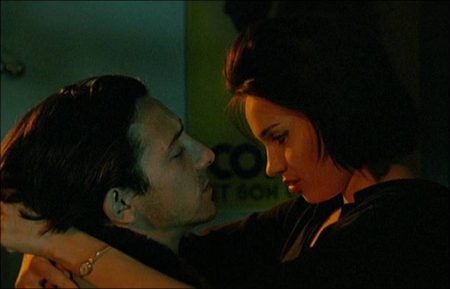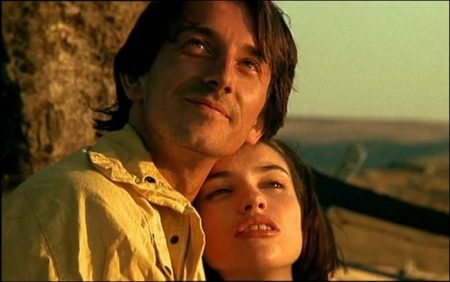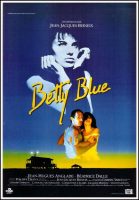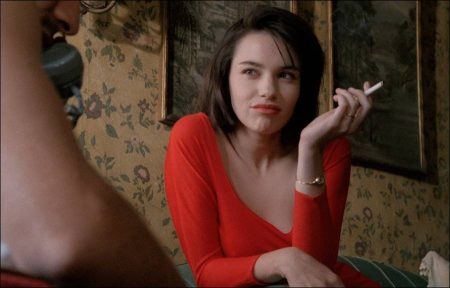
Betty Blue movie storyline. Zorg is a handyman working at the seaside in France, maintaining and looking after the wooden bungalows. He lives a quiet and peaceful life, working diligently and writing in his spare time. He is in love with Betty, a young woman who is as beautiful as she is wild and unpredictable. After a dispute with Zorg’s boss, they leave and Betty finds a place to stay at her girlfriend’s house.
The girlfriend’s lover owns an Italian restaurant and there they find a job. She is obsessed to try to get one of Zorg’s books published, but it is rejected, which makes Betty fly into a rage. Suddenly, Betty’s wild manners start to get out of control. Zorg sees the woman he loves slowly going insane. Is his love for Betty strong enough, if even if it comes to the worst?
Betty Blue is a 1986 French erotic psychological drama film. Its original French title is 37° 2 le matin, meaning “37.2°C in the morning”. The film was directed by Jean-Jacques Beineix and stars Béatrice Dalle and Jean-Hugues Anglade. It is based on the 1985 novel of the same name by Philippe Djian. The film was the eighth highest-grossing film of the year in France. The film received both a BAFTA and Oscar nomination for Best Foreign Language Film in 1986.
About the Story
Zorg (Jean-Hugues Anglade) is a thirtysomething aspiring writer making a living as a handyman for a community of beach houses in the seaside resort at Gruissan on France’s mediterranean coast. He meets 19-year-old Betty (Béatrice Dalle), a volatile and impulsive young woman, and the two begin a passionate affair, living in his borrowed shack on the beach.
After a row with him where she tears apart and smashes up the house, she finds the manuscript of his first novel, reads it in one long sitting and decides he is a genius. However, after another argument with his boss, she empties the shack and burns it down. The two decamp to the outskirts of Paris, where her friend Lisa (Consuelo de Haviland) has a small hotel.
Betty laboriously types out Zorg’s novel and submits it to various publishers. They meet Lisa’s new boyfriend Eddy (Gérard Darmon), and the four have many fun times, often fuelled by alcohol. They find work in Eddy’s pizzeria but a fight erupts in which Betty stabs a customer with a fork. Zorg tries to slap her back to her senses.
Though Zorg hides the rejection letters Betty finds one and, going to the publisher’s house, slashes his face. Zorg induces him to drop charges by threatening him with violence, saying she is the only good thing in his life and she is all he has. Eddy’s mother dies and the friends go to the funeral in Marvejols.
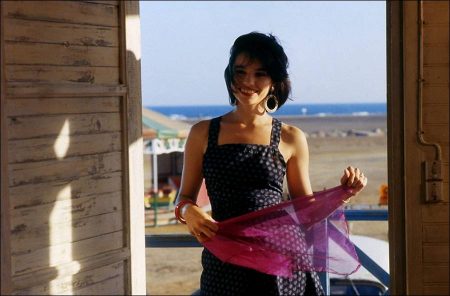
There, Eddy asks Zorg and Betty if they will live in the dead woman’s house and look after her piano shop. Zorg enjoys the quiet provincial life and makes friends with the grocer Bob (Jacques Mathou), his sex-starved wife Annie (Clémentine Célarié) and various offbeat characters, but Betty’s violent mood swings are a concern.
One day, after an irritating comment from Zorg, she punches out a window with her bare hand and goes on a screaming flight through the town. Happiness seems on the horizon when a home test suggests Betty is pregnant, but a lab test is negative and she sinks into depression and tells him she is hearing voices talking to her in her head.
Zorg, masquerading as a woman, robs an armoured cash collection van delivery headquarters, holding the guards at gunpoint and tying them up. He attempts to use the money to buy Betty’s happiness, but she fails to respond and enacts yet another prosecutable offence by luring a small boy away from his mother and taking him to a toy store. Zorg finds her and they both flee from the authorities as they rush to rescue the boy.
Film Review for Betty Blue
Love is not the same thing as nudity. This may seem obvious, but I feel it ought to be explained to director Jean-Jacques Beineix, who has made a film that he thinks is about romantic obsession, and I think is about skin. The name of the movie is “Betty Blue,” and it is the third work by the Frenchman whose first film was the electrifying “Diva” and whose second was the baffling “The Moon in the Gutter.”
Now comes “Betty Blue,” which opens with a shot of two people sideways on a bed, making love beneath a portrait of the Mona Lisa, while the narrator says: “I had known Betty for a week. We made love every night. The forecast was the storms.” This is the kind of opening scene where everybody would have been a lot better off if they had just gone back to the beginning and started over.
The narrator turns out to be the man on the bed. His name is Zorg, and he is in love with Betty Blue, and they are living in one of apparently thousands of beachfront cottages in an out-of-season resort area. They get along just fine in bed. But you can’t stay in bed forever, although they try. Zorg does odd jobs for the man who owns the cottages. Betty Blue does not like the man, and violently insults him before eventually burning down several of his cottages, and chasing him around the beach while she is naked.
She also is not too easy on Zorg. In one remarkable scene, Zorg, in the foreground, keeps his cool while Betty, in the background, throws everything he owns out of the windows. Eventually, however, she has a change of heart about him: She finds a manuscript he has written, determines that he is a genius, and types it up, tens of thousands of words. (Typists will enjoy the typing scenes, in which she makes typing errors, causing her to throw away countless copies of Page 1, and then has the whole manuscript typed in no time.
This is the way typing is thought about by people who always use yellow legal pads themselves.) What is Bieneix trying to say in “Betty Blue”? I am not sure. The behavior of the characters is senseless and boring. We lose interest in Zorg because anyone who could tolerate Betty Blue would scarcely have the discrimination to write a good book. One scene follows another senselessly, like in a soap opera, until Betty goes mad and we can go home.
And yet the movie has made millions in France, where it will not have escaped anyone’s attention that Betty is played by an attractive young woman named Beatrice Dalle, who is naked as often as not. Have you ever had the experience of going to a movie and trying to make sense of the plot, and trying to figure out why anyone has wasted his life and money on the project, only to suddenly have a dazzling insight? That’s what happened to me during “Betty Blue.” Reviews have been written debating the movie’s view of madness, of feminism, of the travail of the artist. They all miss the point. “Betty Blue” is a movie about Beatrice Dalle’s boobs and behind, and everything else is just what happens in between the scenes where she displays them.
This is not altogether a bad thing. In the old days, there used to be such a thing as “skin flicks,” and, yes, they did have a certain basic animal appeal. But they were driven out of business by porno on the one hand, so to speak, and “Dynasty” on the other. Now comes a throwback to the old days when the phrase “French movie” did not mean art, and “art film” didn’t mean art, either, and everybody knew exactly what they did mean, and had their exact change counted out before they dashed up to the box office, so nobody would see them going into a dirty movie. If you can get anything more than that out of “Betty Blue,” consider it a bonus.
Betty Blue (1986)
Directed by: Jean-Jacques Beineix
Starring: Jean-Hugues Anglade, Béatrice Dalle, Gérard Darmon, Consuelo de Haviland, Jacques Mathou, Clémentine Célarié, Vincent Lindon, Dominique Besnehard, Jean-Pierre Bisson
Screenplay by: Jean-Jacques Beineix
Production Design by: Carlos Conti
Cinematography by: Jean-François Robin
Film Editing by: Monique Prim
Costume Design by: Elisabeth Tavernier
Set Decoration by: Jacques Leguillon
Makeup Department: Judith Gayo
Music by: Gabriel Yared
MPAA Rating: None.
Distributed by: Gaumont
Release Date: November 7, 1986
Visits: 2256
